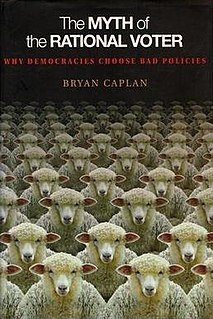Logrolling is the trading of favors, or quid pro quo, such as vote trading by legislative members to obtain passage of actions of interest to each legislative member. In organizational analysis, it refers to a practice in which different organizations promote each other's agendas, each in the expectation that the other will reciprocate. In an academic context, the Nuttall Encyclopedia describes logrolling as "mutual praise by authors of each other's work".
Rational choice theory refers to a set of guidelines that help understand economic and social behaviour. The theory originated in the eighteenth century and can be traced back to political economist and philosopher, Adam Smith. The theory postulates that an individual will perform a cost-benefit analysis to determine whether an option is right for them. It also suggests that an individual's self-driven rational actions will help better the overall economy. Rational choice theory looks at three concepts: rational actors, self interest and the invisible hand.
Public choice, or public choice theory, is "the use of economic tools to deal with traditional problems of political science". Its content includes the study of political behavior. In political science, it is the subset of positive political theory that studies self-interested agents and their interactions, which can be represented in a number of ways – using standard constrained utility maximization, game theory, or decision theory. It is the origin and intellectual foundation of contemporary work in political economy.
Rationality is the quality or state of being rational – that is, being based on or agreeable to reason. Rationality implies the conformity of one's beliefs with one's reasons to believe, and of one's actions with one's reasons for action. "Rationality" has different specialized meanings in philosophy, economics, sociology, psychology, evolutionary biology, game theory and political science.

In economics and business decision-making, a sunk cost is a cost that has already been incurred and cannot be recovered. Sunk costs are contrasted with prospective costs, which are future costs that may be avoided if action is taken. In other words, a sunk cost is a sum paid in the past that is no longer relevant to decisions about the future. Even though economists argue that sunk costs are no longer relevant to future rational decision-making, in everyday life, people often take previous expenditures in situations, such as repairing a car or house, into their future decisions regarding those properties.

Bryan Douglas Caplan is an American economist and author. Caplan is a professor of economics at George Mason University, research fellow at the Mercatus Center, adjunct scholar at the Cato Institute, and former contributor to the Freakonomics blog; he also publishes his own blog, EconLog. He is a self-described "economic libertarian". The bulk of Caplan's academic work is in behavioral economics and public economics, especially public choice theory.
Rational ignorance is refraining from acquiring knowledge when the supposed cost of educating oneself on an issue exceeds the expected potential benefit that the knowledge would provide.
The Calculus of Consent: Logical Foundations of Constitutional Democracy is a book published by economists James M. Buchanan and Gordon Tullock in 1962. It is considered to be one of the classic works from the discipline of public choice in economics and political science. This work presents the basic principles of public choice theory.
Anthony Downs was an American economist specializing in public policy and public administration. His research focuses included political choice theory, rent control, affordable housing, and transportation economics. He wrote a number of books including, An Economic Theory of Democracy (1957) and Inside Bureaucracy (1967), which have been major influences on the public choice school of political economy. In Downs's Law of Peak-Hour Traffic Congestion (1962), he accurately predicted that expanding expressways could not reduce traffic congestion, since demand would increase as well, and that reducing speeds increases capacity.
Noocracy, or "aristocracy of the wise" is a form of government where decision making is dictated by reason (nous). The idea is found in ancient Greek authors, and was expanded upon by geologist Vladimir Vernadsky, and philosophers Pierre Teilhard de Chardin and Édouard Le Roy, and their concept of the noosphere.
Formal epistemology uses formal methods from decision theory, logic, probability theory and computability theory to model and reason about issues of epistemological interest. Work in this area spans several academic fields, including philosophy, computer science, economics, and statistics. The focus of formal epistemology has tended to differ somewhat from that of traditional epistemology, with topics like uncertainty, induction, and belief revision garnering more attention than the analysis of knowledge, skepticism, and issues with justification.

The paradox of voting, also called Downs' paradox, is that for a rational, self-interested voter, the costs of voting will normally exceed the expected benefits. Because the chance of exercising the pivotal vote is minuscule compared to any realistic estimate of the private individual benefits of the different possible outcomes, the expected benefits of voting are less than the costs.
Bent Flyvbjerg is a Danish economic geographer. He is the First BT Professor and Inaugural Chair of Major Programme Management at Oxford University's Saïd Business School and the Villum Kann Rasmussen Professor and Chair of Major Program Management at the IT University of Copenhagen. He was previously Professor of Planning at Aalborg University, Denmark and Chair of Infrastructure Policy and Planning at Delft University of Technology, The Netherlands. He is a fellow of St Anne's College, Oxford.

The Myth of the Rational Voter: Why Democracies Choose Bad Policies is a 2007 book by the economist Bryan Caplan, in which the author challenges the idea that voters are reasonable people whom society can trust to make laws. Rather, Caplan contends that voters are irrational in the political sphere and have systematically biased ideas concerning economics.
Bundling is a concept used for studying the selection of candidates for public office. A voter typically chooses a candidate for the legislature, rather than directly voting for specific policies. When doing so, the voter is essentially selecting among bundles of policies that a candidate or a party will enact if in power.
Criticism of democracy has been a key part of democracy and its functions.
The altruism theory of voting is a model of voter behavior which states that if citizens in a democracy have "social" preferences for the welfare of others, the extremely low probability of a single vote determining an election will be outweighed by the large cumulative benefits society will receive from the voter's preferred policy being enacted, such that it is rational for an “altruistic” citizen, who receives utility from helping others, to vote. Altruistic voting has been compared to purchasing a lottery ticket, in which the probability of winning is extremely low but the payoff is large enough that the expected benefit outweighs the cost.

Ilya Somin is a law professor at George Mason University, an adjunct scholar at the Cato Institute, a blogger for the Volokh Conspiracy, and a former co-editor of the Supreme Court Economic Review (2006–2013). His research focuses on constitutional law, property law, migration rights, and the study of popular political participation and its implications for constitutional democracy.

The Ethics of Voting by Jason Brennan is a book which outlines a contrasting argument to the idea that it is the civic duty of individuals within a democracy to vote. The core tenet upon which his argument resides is that the individuals who do not know what they are voting for should not feel the moral obligation to vote on issues about which they are uninformed, and that democracies would benefit as a whole from their abstaining from the polls.
Political cognition refers to the study of how individuals come to understand the political world, and how this understanding leads to political behavior. Some of the processes studied under the umbrella of political cognition include attention, interpretation, judgment, and memory. Most of the advancements in the area have been made by scholars in the fields of social psychology, political science, and communication studies.





